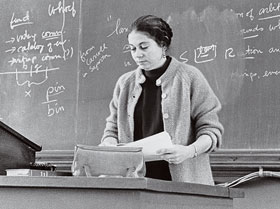Gaby Mayer '16 As a woman (not to mention a feminist), I spend a lot of time thinking about what it means to be female: as a scientist, as a college student, as a so-called “millennial,” and as a consumer of contemporary art and culture. Curiously, however, I haven’t truly contemplated what it means to be a woman at Amherst College, the place I’ve called home for nearly four years. To call me “willfully ignorant” would be an understatement; after all, Amherst is an institution with a rich and complex history around gender. The College was founded in 1821 as an all-male school, only making the shift to a co-ed student body in 1979 (to put this into historical perspective: Oberlin College has admitted both men and women since 1833). It’s been roughly forty years since this momentous change, and yet the physical vestiges of our male-dominated past still litter the campus––from the profusion of male portraits in its central gathering space, Johnson Chapel, to the distribution of its plumbing. This is further complicated by our membership within the Five College Consortium, a group that includes two women's colleges–one the oldest in the nation, the other the largest–among its ranks. Stated simply, the Pioneer Valley is a place where gender has always mattered. Luckily, this past Tuesday, I stumbled into a conversation series titled “Six Talks to Change The World: Pioneer Faculty Women." This event name is, admittedly, a bit flashy–all the better to lure tired, busy undergrads out of the library on a weekday evening. Yet despite my aversion to hyperbole, I believe the title “pioneers” is justly bestowed here.  Rose Olver in the classroom. Rose Olver in the classroom. Over the course of the evening, the featured guests—Amherst College Professors Buffy Aries (Psychology) and Patricia O’Hara (Chemistry)--spoke to a rapt audience about their experiences as some of the first female tenured faculty members at Amherst. Some of the anecdotes were so unbelievably outrageous, they verged on the comical – such as when two academic officials bickered over Professor Aries’ dating prospects in the middle of a job interview. Other memories were more sobering. I couldn’t help but shake my head as Professor O’Hara ran through the long list of female biophysicists hired by the Chemistry Department in the 1960s–every single one of whom packed up their bags within months of arriving, seeking institutions more welcoming of their womanhood. For me, the most poignant anecdotes highlighted the ways in which female identity unfolded within Amherst classrooms. Through the first half of the 20th century, the College espoused a rather assertive teaching style, in which professors were encouraged to challenge and dismantle the comments put forth by their students. This was troubling to female professors, who found themselves at odds with this analytical, incisive form of pedagogy; many of these women were more partial to the kind of inclusive, supportive learning environments promoted at the women’s colleges just down the road. Students picked up on this distinction: where end-of-semester surveys described male professors as “demanding” or “stimulating,” their female counterparts were referred to as “kind” and “encouraging". Unfortunately, these affective differences had larger consequences. Female professors were generally thought to lack rigor, and their students’ comments functioned as confirmation of this fact. In fact, student surveys were often viewed as the “kiss of death” for the tenure applications of female faculty. Said otherwise: the standards of teaching excellence at Amherst necessarily excluded women from its ranks. Fortunately, we know this story to have a happy ending. In 1962, Rose Olver became the first woman to receive tenure at Amherst, and began reforming the College’s hiring process from the inside out. Over half a century later, my experiences can stand as testament to the progress we’ve made. This semester alone, three of my courses are taught by women faculty; two of them are made up entirely of female students; one of them is devoted to thinking critically about the way womanhood plays out in science and math fields. This campus has become a space where female scholarship is championed. As such, it can be easy to forget what a charged, potent thing it is to be a woman studying at Amherst College—to remain fully cognizant of the immense history that comes with the very fact of my enrollment. When studying inequalities of the past, it’s tempting to look at our present through rose-colored lenses, thinking about just "how good we have it" compared to our predecessors. But it would be naive to assume that Amherst has achieved a gender utopia. Far from it. As a campus, we still grapple with plenty of issues around sexism. So if examining our history makes our current plight feel trivial or frivolous, then perhaps we have missed the point entirely. For me, Tuesday’s talk served to galvanize and reaffirm my activism; I choose to let my past empower my present. I am not alone in this sentiment: Professor O’Hara attributed her success to those who came before her, describing herself as “carried on the shoulders” of all the female biophysicists who could not achieve tenure. As for me, I feel similarly "on the shoulders" of the Rose Olvers, Buffy Aries, and the Patricia O’Haras who paved the way so that students like me could write blogposts like this. I owe it to these women–and to myself–to keep working towards equal treatment and opportunity.
4 Comments
5/19/2024 04:30:13 pm
Purchase lots of flowers often to manage your household. Or, carry some dwell plants in addition to herbs. They are prepared for absorbing household pollution therefore maintain an innovative environment in your house. Grow your individual herbs garden with your kitchen. These very little things can enhance the inner magnificence and smell in your home. All these how-to's are the beginning of making a property smell good. In event, you involve assistance on your house clean-up, DIALAMAID clean-up service has arrived to assist you to. Book some sort of deep clean-up service for making your household smell superb, right at this point.
Reply
Leave a Reply. |
About this blogHere, you can find periodic updates on our progress and events in which we have participated. Archives
May 2021
|

 RSS Feed
RSS Feed